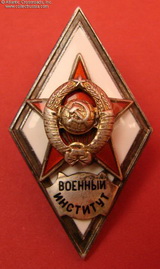
`Military Institute of Foreign Languages` graduate pin (year of 1954), which Ruvim would have recieved, but did not...
|
Indeed, I came from a poor peasant family (Mikhlin & Katz), joined the military before WWII,
was wounded in action, and have had only commendations
from my superiors.
All that taken into account, I was spared and allowed to continue my studies…
but only until the end of that year. There was no admission for further studies
(despite the fact that I graduated the program cum laude)...
The Jewish cadet from the parallel English group was let go. The fellow cadets
from my group were sent to do the coveted work in Eastern Germany, while I was
summoned to the personnel department to be told:
"The current international situation, Comrade Katz, does not allow us to assign
you to linguistic work.
However, you will continue your service in the regular army. Given your
excellent academic achievements, we are giving you the opportunity to choose the
military district for the remainder of your service.”
The Head of Human Resources began to name one military district after another,
starting with the most distant ones—Far Eastern, Transbaikal, and so on.
As soon as he called the Leningrad military district, I woke up.
In fact, my cousin Lazar Mikhlin(1903 - 1987)
, with whom I grew up and maintained a close friendship, lived in Leningrad (now
St. Petersburg).
|